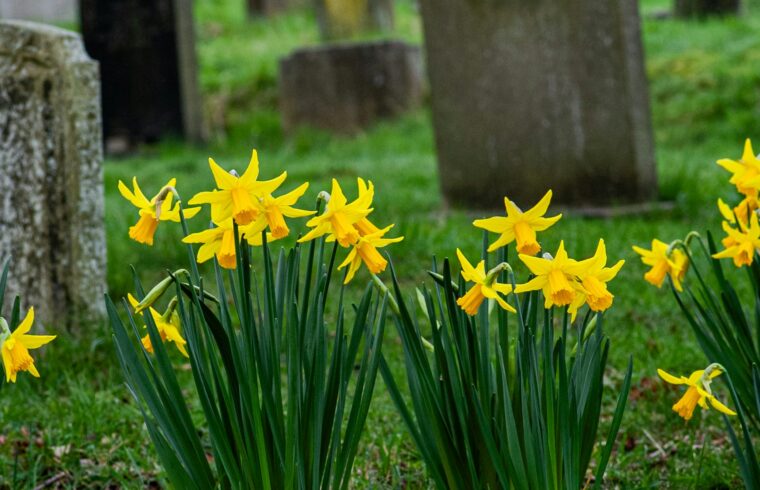Pause with me for a second, and think back—when was the last time you scrolled through social media after someone you knew passed away? You know the kind of moment: a flood of posts, basically a digital wake. Comments like “They’re in a better place now.” “Heaven gained another angel.” “Our guardian angel watching over us.” It’s all meant to bring comfort, to ease the sting, to wrap raw grief in something softer. Honestly, though — doesn’t it sometimes feel like we’re just trying to hurry past the hardest part? Like we want to tie a bow on an ache that doesn’t really go away? Maybe that’s why, deep down, those “praying hands” emojis or heart reacts can feel… well, thin. There’s something in us that wants to do more. Something that says, “Love’s bigger than a hashtag. This loss deserves more space.”
Thank you for taking the time to read this homily for the Commemoration of all the Faithful Departed – ALL SOULS DAY (November 2, 2025). Your support means a great deal to me, and I’m deeply grateful for the many who share these messages with their friends, families and social media followers. If you’ve found meaning in these words, I’d be grateful if you’d share them with others who might benefit.
And for those who prefer listening, you can find the audio version on SoundCloud HERE or subscribe to the podcast on iTunes HERE. Your comments, messages, and the way you’ve embraced these homilies continue to inspire me. Sincerely in Christ -Father Jim
That’s exactly what All Souls Day is about—a day the Church sets apart not just to remember, but to do something: to actually reach out to our loved ones who’ve died, to keep them company, to aid them with our prayers. In a world that mostly tells us to move on or distract ourselves, All Souls Day tells us: Don’t rush. Don’t run from what aches. Instead, step into the quiet, bring your hope and your hurt, and become part of something ancient and human and real.
Yesterday was a whole different vibe: All Saints Day is like the Church’s victory lap—reminding us that this life isn’t the end. We get to look up and see the saints, ordinary people who made it, those tried and tested souls cheering us on. Joy, hope, a sense of “Yes, this is what we’re made for!”
But today’s different. The Church calls us to look around at each other, and also to look back—to everyone who’s died, especially those we love, and all the souls who aren’t quite in heaven. We call them the Holy Souls, “the Church Suffering.” They died in God’s love, but they need that last touch of healing before they’ve got that front-row seat to see God face to face. Catholics have been showing up for this for centuries — offering what matters most: serious prayer, hidden sacrifices, little acts of generosity, and above all, this Eucharist. No empty rituals. These are gifts to experience to share in God’s mercy.
But why bother? Why do we hold onto this, year after year, when the culture around us says, “Let it go,” or “It’s all good now?” Take a look at the way we treat death today. We’re all about editing — curating perfect moments, filtering out reality. Funerals have gotten shorter — sometimes swapped out for “celebrations of life” that feel more like reunions than real goodbyes. And if you’re deeply grieving, people sometimes look at you like you’re broken or stuck in the past. Their message is: “Don’t cry too long—just remember the good times. Don’t spoil the mood.”
Our ancestors couldn’t do that—death was part of the every day. Now we try to ignore it until it knocks on our door, or shows up in our feed, or hits our circles, our families.
And it’s not only about hiding from sadness. It’s this reflex to “canonize” the dead—like we have to announce at the funeral, “She’s definitely in heaven,” or, “He’s our angel now, looking down on us.” It’s a sweet instinct. We want to escape the pain, and honestly, it’s easier than wrestling with the uncertainty and the unfinished business of being human.
But here’s the thing—the Church is less about airbrushing our pain and more about meeting it with honesty. She says, “Don’t run from this. Don’t use sugar-coating. Look at death through the lens of real hope, not fake happy endings.” For centuries, Christians have offered prayers for the dead—not because love dies, but because it lives on, growing deeper, acting across the boundary that everyone else thinks is final.
There’s something fiercely beautiful about this. We talk about being “one Body in Christ”—and it’s real. We’re connected, not just to the people we see around us, but to all those who died in God’s friendship. None of us is cut off—not by distance, not by regrets, not even by death. The saints intercede for us, and we get to do the same for those souls still on their journey home. Praying for the dead doesn’t “save” them by our own power, but it connects us, like a spiritual phone line, to God’s ocean of mercy.
Now, let’s talk purgatory. I know, I know—it sounds gloomy. But it’s not some medieval horror show. Purgatory is more like a deep clean after a long, hard road. Imagine finishing a mud run—sweaty, caked in dirt, exhausted, but knowing you’ve accomplished an incredibly difficult task. Before you flop onto the couch, you need a shower, right? Heaven’s like the ultimate after-party—you want to show up fully yourself, undistracted by the grime or baggage left over from life. That’s purgatory: not punishment, but real love, burning away the stuff that doesn’t belong in perfect joy. As one of St Padre Pio’s spiritual directors, Fr. Dolindo Ruotolo, once said, it’s “the fire of Love—a love so pure and intense it burns away every trace of unworthiness.” Praying for the dead, then, isn’t gloomy; it’s a way of staying friends, even when there’s distance, by helping each other get fully free.
If talk like this makes you squirm, you’re not alone. Our age isn’t comfy with mystery—the stuff we can’t see or measure. But let me remind you of a moment that shocked even our “cynical” world.
In 2016, at the funeral Mass for Supreme Court Justice Antonin Scalia, you had the Basilica of the National Shrine in Washington D.C. packed—family, friends, leaders, thick with media and politics and expectations. The script was set: eulogies, maybe jokes, mostly comfort, a sanitized send-off. And then Fr. Paul Scalia, his son, steps to the pulpit. Everyone settles in, bracing for what they think is coming—a poetic, personal tribute.
He opens with, “We are gathered here because of one man. A man known personally to many of us, known only by reputation to even more. A man loved by many, scorned by others. A man known for great controversy, and for great compassion.” The crowd’s hanging on his words, thinking obviously he’s talking about his dad.
Then—he flips the whole script: “That man, of course, is Jesus of Nazareth.” Dead silence. No one breathes. “It is He whom we proclaim—Jesus Christ, Son of the Father, born of the Virgin Mary, crucified, buried, risen, seated at the right hand of the Father. It is because of Him—because of His life, death, and resurrection—that we do not mourn as those who have no hope. It is because of Him that we gather here today.”
People were stunned. Reporters and politicians looked around, caught off guard. The script for a “proper” public funeral had been torn up. Instead, Fr. Scalia gave his father the greatest gift a son can—a confident, humble act of faith, lifting his father’s soul into the hands of the merciful Lord, anchoring every hope not in fame or even virtue, but in the cross and resurrection of Christ. He reminded us that a Catholic funeral is first and last about Jesus. In that moment, he was not canonizing his father, nor erasing what made him complex—he was pleading, in the presence of all, for God’s mercy and inviting all present to do the same. He modeled the humility and realism of our faith—the recognition that no matter who we are, how great or beloved or famous (or not) there’s a universal need at the dawn of eternity for God’s mercy.
That’s exactly the point of today. We pray, we remember, we offer Masses for the dead—not only because the Church reminds us to—but because it’s an act of charity to stand in the gap for each other, it’s an act of faith that emphasizes our connection with those who have died. And we do that with the humility that few of us at our deaths are ready to be canonized. Maybe there were unresolved issues, maybe there were unspoken resentments, maybe there were hurts and pains that weren’t fully addressed or some obstacles not fully overcome. Those real pains that we and our loved ones carry. There’s no place for sadness or sin in the perfection of heaven. Which is why that period of purification of purgatory isn’t something we should dread or fear but recognize as a gift.
It reminds me of this story that, again, one of St. Padre Pio’s spiritual directors, Fr. Dolindo Ruotolo, recounts in his book entitled The Afterlife. In Montfalco Italy, a little over a century ago, there was a convent of cloistered sisters. They had limited contact with the outside world, following a strict rhythm of prayer and penance. Being cloistered meant they hardly saw anyone… even those who came to communicate with them had to do so through a small grating. To accept donations, the nuns had a turning table through an opening in the door where a person would put them and rotate it to the other side. One autumn evening, the quiet was broken by the sound of the turntable bell at the convent door. The abbess, Mother Marie Therese, answered it, but found no one—only silence, and a small voice, grave and sorrowful, that she could not see.
“I must leave here this alms,” the voice said. She looked down and saw ten lire left on the turntable, and before she could speak, the voice was gone. The sisters wondered among themselves who could have come; no one had seen or heard a visitor. Still, the abbess used the alms to have a Mass offered for the souls in Purgatory.
Weeks passed. Then, on the evening of October 6, the bell rang again. The same voice returned, solemn yet grateful: “Thank you very much. I leave here this alms.” Again ten lire. The abbess, now a bit unnerved but moved by something deep, asked, “Who are you?” Silence. Only silence.
The voice returned yet a third time—this time with twenty lire. And then, finally, on October 20, as several sisters heard the bell together, the abbess managed to call out, “Who are you, and why do you come here?” The reply from the other side of the door: “I am a soul in Purgatory Forty years I have been in purgatory for having squandered the goods of the Church.” The sisters remained unnerved even suspicious as the visits kept occurring. He subsequently revealed that he had been a priest and the amount he brought totaled over 300 lire. After months of similar manifestations and dialogue, the soul came one last time. Sister greeted him with “Praised be Jesus and Mary” and the voice responded “Be they praised forever. I thank you and all your community because now I am free from all my suffering…” He promised them his prayers in turn and departed from them with the words “The blessing of God be on you all…”
When word of this reached Fr. Dolindo Ruotolo, he read it not as a ghost story but as a living parable. It was a glimpse beyond the veil, an urgent reminder that our prayers, sacrifices, and charity have real effect. This soul—a priest—had not found rest until the living intervened. Even then, the prayers had to keep coming. Intercession mattered. Purgatory, Fr. Dolindo wrote, “is not the fire of vengeance, but of Love—a love so pure it burns away all that is unworthy of Heaven. And those souls, while they suffer, bless us a hundredfold for every prayer we offer.”
What this mean for us—in our world, in this parish, among families who grieve – is that our prayers are not perfunctory or empty. When we offer a Mass for someone, when we whisper a Hail Mary at the graveside, when we give even a modest alms and say, “For the poor souls,” we are continuing the work of mercy Christ gave us. We are not letting go of our loved ones; we are participating in the heart of God. We are not canonizing them out of reach of our prayers, nor forgetting them in a rush to move on. We are loving them still, now with a love that is practical, mystical, and powerful.
So today, as we gather at this altar—where Christ’s death and resurrection are made present—let us not shy away from praying for our dead. Name your loved ones. Offer your sufferings alongside Christ’s for those in need of mercy. If you can, have a Mass said for them, give to someone in need in their memory, and trust that God will turn your offering into blessing.
Let’s not squander the privilege of being one Body, united across time and death. Let’s be bold in our hope and our mercy. Christ has conquered death, and in Him, every prayer, every Mass, every act of love resounds into eternity—bringing relief, peace, and final joy to those for whom we pray.












Beautiful homily, thank you.
May the souls of our faithful departed be at peace with God.